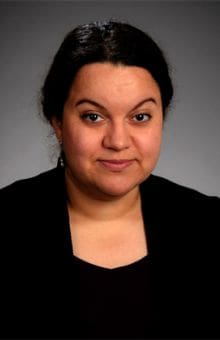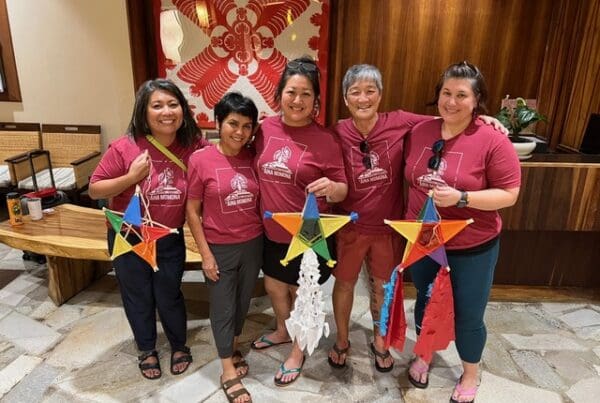In 2020, the Academic Research Moms (ARM) fund was created, a crowdfunding initiative to support medical and research trainee moms.
Specifically, the fund focuses on offsetting child care costs for Black women with young children. To help get funds to those who need it, ARM is currently collaborating with Meharry Medical College in Nashville, Tennessee, which supports students and trainees at historically Black colleges and universities.
Below, one of the fund’s creators, Mariya Sweetwyne, PhD, an assistant professor in the Department of Laboratory Medicine and Pathology at the UW School of Medicine who specializes in cell biology, shares why assisting women and mothers in medicine and science is not just an act of support, but a necessity to achieve equal access to education and research.

Mariya Sweetwyne
What motivated the creation of the ARM fund?
I helped create the ARM fund and have been the main coordinator for collecting funds and partnering with nonprofits, but I want to be very clear that I did not do this alone. The real drivers who made creating the fund feasible came from all over the country and were the other Academic Research Moms who championed the fund.
When I was a new mom, I was participating in a private Facebook online support group for women who were parents and academicians in research and medicine, called Academic Research Moms. At the time, there were more than 2,000 members — now over 3,000 — and the extreme pressure these women were reporting between their academic careers and their families during the lockdown was universal and constant. On top of that, many of them were in clinical medicine, which meant that they were literally on the pandemic front lines. But the group was open to women at all levels in academia, and it was becoming very clear that not everyone had the same financial resources to mitigate this strain. Postdocs were just as pressed as associate professors, but they couldn’t afford to hire a night nanny or order take-out for a week to capture back working hours. We started to hear that women were leaving academia at first anecdotally, but it seemed like the numbers were high. Then researched articles published in places like the New York Times and Scientific American. The journal Nature also reported this and we realized it wasn’t just an impression, it was really happening.
What took the ARM fund from an idea to action?
At the same time as these conversations about women leaving academia, the conversations around how to address systemic racism in our institutions were also at a near constant after the murder of George Floyd. One thing I was hearing at that time about institutional, systemic racism was the importance of conversations to better understand the issue. I am myself Black biracial, and it was galling to hear so many people talk about creating even more talk to figure out something we live every day. Institutional racism doesn’t come from the ethos, it comes from the decisions people make based on their own values that either do not consider or intentionally discount the needs or contributions of those in minority groups.
Many conversations about women in academia and systemic racism in the ARM group started with, “I don’t know what to do.” My thought in proposing the fund was that any action, even if imperfect to start, might be a better way to move the needle than to have one more conversation. One of the group leaders, Tamar Gur, at The Ohio State, said, “When you don’t know what to do to help yourself, help others.” So, we started a fund to help the people whose needs we understood, women like us: mothers in academic research and medicine.
Why is it important that the community and healthcare professionals understand the importance of helping Black women in medicine and science with young children?
With the onset of the pandemic, we all saw hard numbers demonstrating racial disparity in how communities of color were being affected by COVID-19. Some of this was driven by how people had been treated historically, but there were also many reports of patients either not having access to care or receiving inadequate or dismissive care in real time.
We need to have better representation of our national diversity in our higher academic and medical care spaces if we are going to achieve actual public health. Black mothers are central to voicing the Black community’s needs and raising and addressing issues affecting marginalized communities all over the U.S.
Bringing in and retaining more Black women at the leading edge of research and medical care, especially in positions of institutional leadership, is one way to make sure that the people who are already serving our varied communities are also in a position of power to determine institutional policies.
What are the future goals of this initiative?
We are working on setting up a nonprofit dedicated to providing support for trainee moms in academic research and medicine. This year it has been hard to make traction on that because we are also all academic research moms. We are also struggling with our own work-life balance and the lasting effects of the pandemic on our families, laboratories and clinics. Still, slow action is more likely to get us somewhere than doing nothing, so we will keep pushing at it until we’ve done it.
How will the funding be spent?
We are completely run by volunteers, so whenever we get money in, we send it right back out. We don’t keep any of the funds, and the overhead from our partners is very small to nothing.
Money gets to women very quickly. Through one partner, Meharry, 100% of the money we send to them is given directly to women in their program. Meharry gives around $1,250-$1,500 to each recipient, and they have supported more than 35 women with those funds so far. When you are raising kids with a graduate student or postdoc stipend, that “small” amount of $1,500 might be half a month’s pay and can be the pressure valve release that is sorely needed.
Through another former partner, The HBCU Foundation, we were able to make a few larger gifts. One woman doing her medical residency as a single mom with three kids, including one with significant special needs, received $7,000.
We specifically said that women could use it in any way that supported their academic pursuits while raising children. It could pay for daycare or extra babysitting, a laptop to better work from home, or it could pay for that occasional emergency take-out night when there is a deadline looming. Families and training programs are unique; women who are already managing to juggle this challenging path know what resources they need to make it work.
What are some child care challenges moms face?
There is the obvious, which is availability and affordability. I’d like to see more campus child care spaces at UW Medicine and a change in our institutional culture around work flexibility and life balance.
Nationally, folks in trainee and junior academic medicine and research positions are not being given enough support — this is compounded for parents and people of color. The financial compensation you get as a graduate or postdoctoral trainee barely supports one adult in a city like Seattle.
There is still an expectation in this field that if a trainee wishes to secure an academic position, they will work all the extra hours physically possible and for low compensation. But this isn’t tenable for anyone without private financial resources, especially for people with family obligations. Biomedical institutions that are serious about fostering diversity in all its forms will recognize that in addition to better financial support, flexibility is the key to allowing driven academics to find a way to thrive both at work and home. This must be extended to clinicians as well. I have been shocked to hear from women physicians who took only three weeks of maternity leave — sometimes less — away from residencies and fellowships.
What work is being done at UW Medicine to support child care challenges?
I would like to highlight two things that have happened recently that I think are great examples of flexible institutional support for caregivers.
The first is that the UW has a backup care program that offers affordable emergency child care options with reduced drop-in rates at some daycare centers. It was already a great program, but I was so impressed when it was announced that it could also be used to compensate a neighbor or friend for babysitting. This is a strong example of providing flexibility to let people use the best solutions.
The second is a new departmental award program that will be instituted in the Department of Laboratory Medicine and Pathology. The departmental Justice, Equity, Diversity, and Inclusion (JEDI) committee is setting up an award for junior faculty and trainees to offset the costs of caregiving associated with attending national conferences. Applicants must request the award in advance and describe how it will be used, but how awardees apply the funds is very flexible. For example, it can be used to hire a night nurse if you have an adult dependent, pay for child care at a conference location or to ship breastmilk home to an infant. Access to conferences and national training courses is critical for professional advancement, and this award will lower the barrier to access for trainees with caregiver responsibilities. This is a great example of a relatively low-cost way UW departments can support caregivers in their academic work. It makes me proud to be a faculty member of the department.


